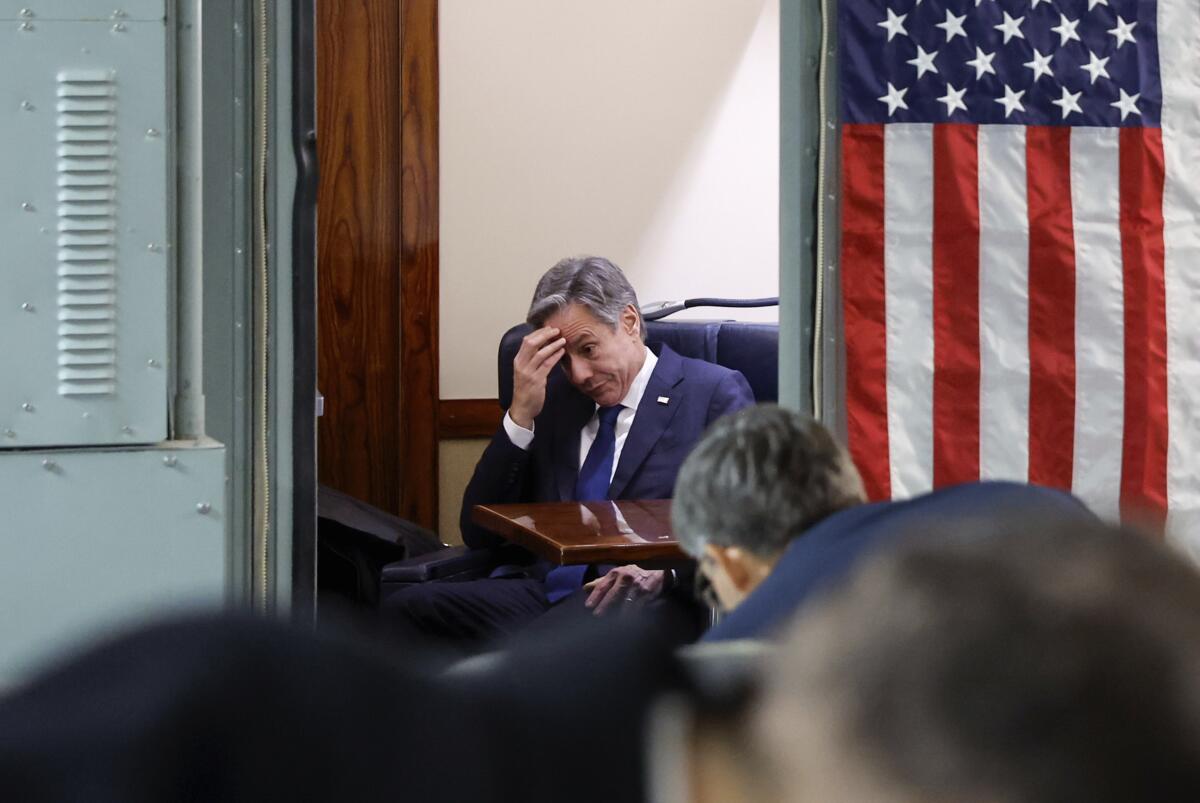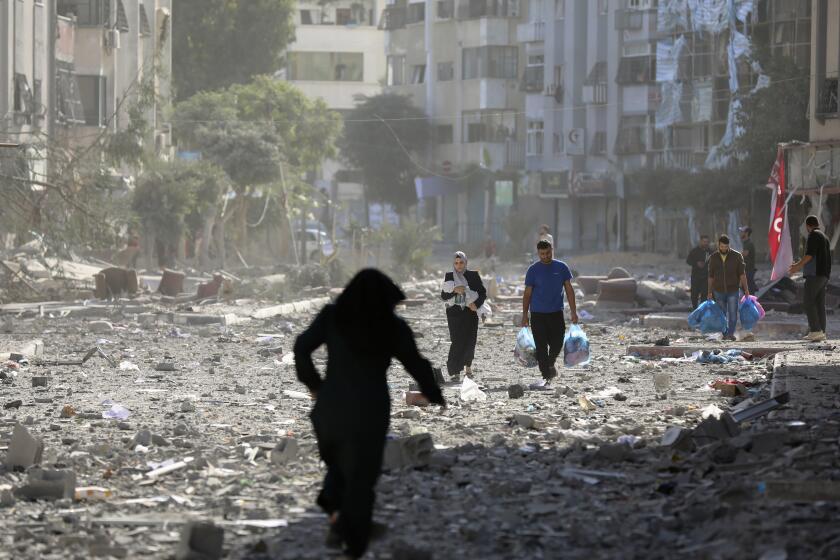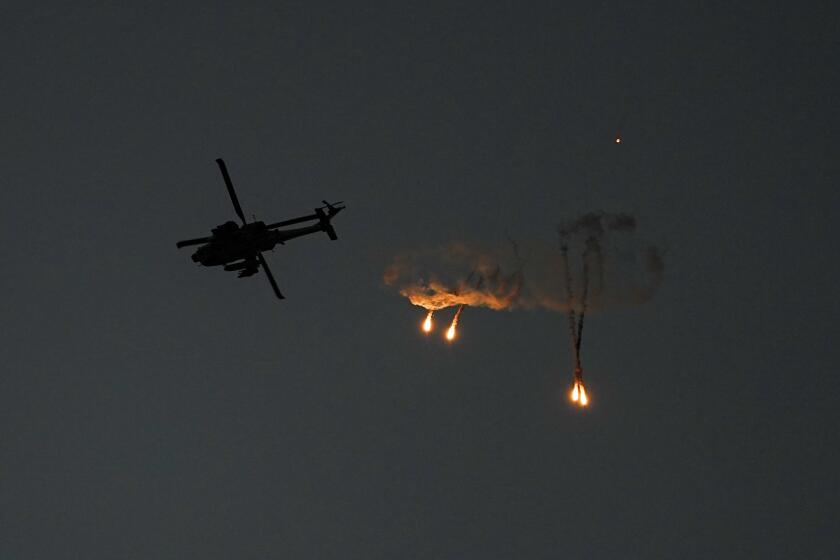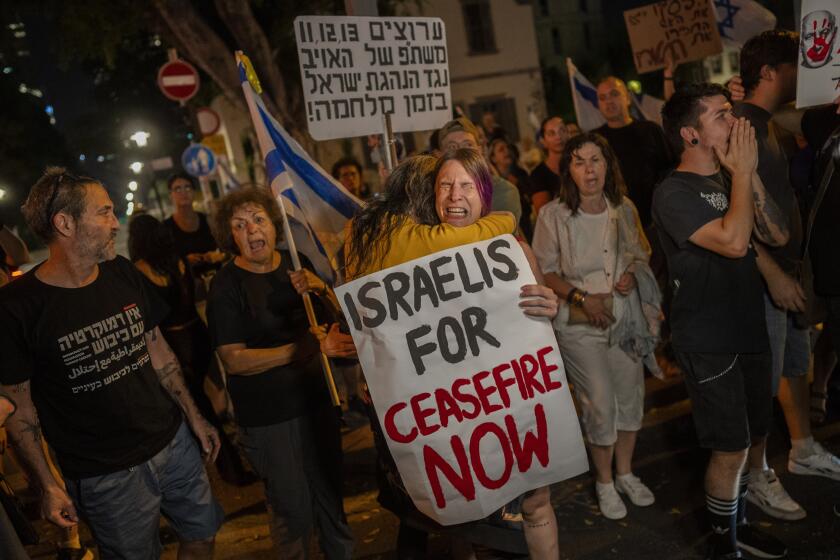News Analysis: U.S. coming up short in full-court diplomatic press with Israel and Arab world

- Share via
WASHINGTON — Israel’s war with Hamas, which has killed thousands of people in a single month, is reverberating across the globe, roiling U.S. politics while sowing division in universities and workplaces — and inside the Biden administration.
Yet the administration’s efforts to contain a widening and disastrous conflict appear to be falling short, despite intervention by President Biden and the most muscular diplomatic push to date by his top diplomat, Secretary of State Antony J. Blinken.
Israel has repeatedly rebuffed advice from the U.S., its staunchest ally. And friendly Arab nations that initially joined U.S. condemnation of the Oct. 7 Hamas attacks against Israel that triggered the war have gradually distanced themselves from Washington.
The chaotic dynamics have fueled uncertainty over how the conflict will play out, how it will end and what the resulting landscape will look like.
Biden said Thursday that he asked Israeli Prime Minister Benjamin Netanyahu in a telephone call Monday to suspend military operations for several days to save Palestinian lives, ease the humanitarian crisis and press negotiations to release hostages.
But Netanyahu refused, Biden said. The president was asked whether he was frustrated with Netanyahu, with whom he has had a decades-long friendship.
“It’s taken a little longer than I hoped,” Biden told reporters as he left the White House.
Instead, the White House said, Israel on Thursday agreed to a daily four-hour pause in bombings and other military operations to allow Palestinians in the Gaza Strip to move south to safety and the international community to transport shipments of food, medicine and other aid into the besieged coastal enclave.
U.S. military advisors are taking ground-war lessons from Iraq to talks with Israel. Whether Israel will take the advice is unclear.
A second north-south corridor along the coast will be opened for Gazans to flee, Israel said. Tens of thousands of people, many on foot, have been moving down the strip’s main north-south highway in recent days in hopes of escaping Israeli airstrikes that have laid waste to entire neighborhoods as well as the Israeli incursion that opened a new phase of ground combat in tight urban spaces.
Many Palestinians resisted leaving their homes, afraid they will never be allowed to return. The forced displacement of civilian populations is considered a violation of international law.
U.S. officials said the pauses, if they come to pass, would be a good first step, albeit a limited one — any deal to free hostages would not be directly connected. Separately, hostage negotiations were taking place in Qatar, where Hamas has offices and where the government has relations with the militant group. CIA Director William Burns was reportedly present Thursday.
Israeli officials estimate that Hamas militants and an allied group, Palestinian Islamic Jihad, hold 239 hostages, including children and elderly people, after the release of four women. The hostages were seized by militants in the Oct. 7 attack in southern Israel in which more than 1,200 people were killed. Fewer than 10 U.S. citizens are among those held captive, Biden administration officials say.
Backed by the U.S., Israel has steadfastly refused to consider a cease-fire, even as demands for one have grown worldwide, from the United Nations and numerous Arab and other countries. Israel argues that any cessation of hostilities would allow Hamas to regroup and rearm in preparation to attack Israelis again.
The pauses announced Thursday are not a cease-fire, Israel said; fighting would only be suspended in specific areas.
U.S. officials say Israel appears extremely confident in its prosecution of the war, which may explain its resistance to the Biden administration’s requests.
Nonetheless, pressure has mounted for Israel to shift its tactics as the death toll in Gaza from massive Israeli airstrikes has soared past 11,000, according to the Hamas-run Gaza Health Ministry, including at least 4,000 children. UNICEF called Gaza a “graveyard for thousands of children.”
After pointed complaints from King Abdullah II of Jordan, the United Nations and international humanitarian agencies, Secretary of State Antony J. Blinken made his deepest plea to date for the safety of Palestinian civilians in the Gaza Strip.
White House National Security Council spokesman John F. Kirby said “many, many thousands” have died. “I think we would agree that too many civilians have been killed,” he said.
Netanyahu also vexed U.S. officials when he told ABC News this week that Israel would have to assume “overall security responsibility” over Gaza “for an indefinite period,” suggesting plans to occupy the strip of land that, at least before the war, was home to some 2.3 million Palestinians.
The Biden administration has been adamant that postwar Gaza should be free of Hamas but not occupied by Israel, and that it remain Palestinian — ideally part of a future Palestinian state.
“The United States believes key elements should include no forcible displacement of Palestinians from Gaza — not now, not after the war,” Blinken said, pointedly responding to Netanyahu after urgently crisscrossing the Middle East holding talks in six countries in a matter of days. “No reoccupation of Gaza after the conflict ends. No attempt to blockade or besiege Gaza. No reduction in the territory of Gaza.”
Israel has also ignored U.S. entreaties to rein in hard-line Jewish settlers in the occupied West Bank, where they have attacked Palestinian villagers. Israeli officials tell their U.S. counterparts that they will comply, but don’t, according to people familiar with the talks. Instead, members of Netanyahu’s Cabinet have been handing out more guns to the settlers, whose presence in the territory is considered illegal by the U.N. and most nations.
A Times special correspondent in Gaza offers a personal account of living in a place where nowhere feels safe.
Administration officials have repeatedly defended Israel’s right to retaliate against Hamas, but said they have consistently cautioned Israeli officials to obey international law, which requires the military to make every effort to distinguish between combatants and civilians and to attack with proportionality. But U.S. officials have publicly declined to judge whether Israel is following the guidelines laid out in the Geneva Convention and elsewhere.
Blinken, whose family includes Holocaust survivors and whose early reactions to the Oct. 7 attacks were heartfelt and visceral, has since then come the closest among administration officials to indicating that Israel is not completely observing the rules of war.
“There are steps, additional steps, that we believe Israel can and should take to minimize civilian casualties and to minimize the suffering of people,” Blinken said Wednesday in Tokyo, while acknowledging it can be difficult because of Hamas’ well-documented tactic of embedding fighters, weapons and equipment within the civilian population.
But, Blinken said, “Israel still has an obligation to distinguish between terrorists and civilians.”
Still, discord over the way the Biden administration has handled the most explosive Middle East crisis in generations has spread, including within U.S. foreign policy agencies.
Several petitions or letters of complaint have circulated within the State Department and the U.S. Agency for International Development.
One State Department employee quit in protest, another accused Biden of complicity in genocide. A memo criticizing unbridled support for Israel and urging a cease-fire was submitted to the department’s Dissent Channel, an internal mechanism through which foreign service officers can freely express disagreement with policy.
“This conflict is incredibly fraught,” State Department spokesman Vedant Patel said. “This is an incredibly trying and taxing time. ... We expect people in our workforce to have different personal beliefs, different beliefs about what U.S. foreign policy should be. And we encourage individuals to continue to make those opinions known.”
A month after Hamas’ surprise attack nearly brought Israel to its knees, the country’s battered ‘peace camp’ is rising — or trying its best to do so.
Many of the critics are among a younger generation in government, people in their 30s who are too young to have lived through earlier crises in the region such as the two intifadas — Palestinian uprisings demanding an end to Israeli occupation that devolved into deadly clashes with Israel’s military.
Washington’s closest allies in the Arab world, none of them particularly fond of Hamas, publicly issued mild criticisms of the Oct. 7 attacks in the initial aftermath. Privately they were more forceful, telling administration officials they supported routing Hamas.
But once Israel’s bombardment of Gaza began, with images of multistory residential buildings collapsing in smoke and bodies being pulled from rubble, several Arab states became the most vocal proponents of an immediate cease-fire. The leaders and their populations could not tolerate the massive casualties, they said.
While Egypt, Jordan and a few others continue to work with U.S. officials to ease the humanitarian crisis and other issues, it is a process that remains behind the scenes, left to quiet diplomacy.
More to Read
Get the L.A. Times Politics newsletter
Deeply reported insights into legislation, politics and policy from Sacramento, Washington and beyond. In your inbox three times per week.
You may occasionally receive promotional content from the Los Angeles Times.















